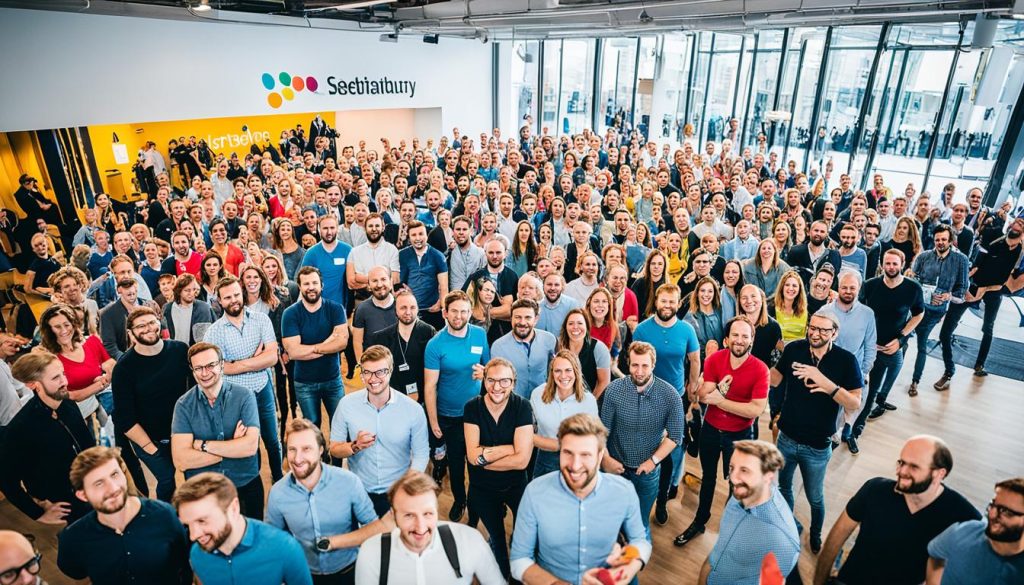Delve into the explosive growth of Germany’s software industry with us. In the past few years, it has seen massive success. This piece sheds light on what’s behind this growth and the chances and hurdles it brings.
Germany stands out for its sturdy economy and tech advances. It’s a top spot for software development, thanks to many thriving companies and startups.
Several factors fuel the sector’s growth. A major one is the skilled workforce, thanks to Germany’s focus on technical education and vocational training.
Support from the government and private sector also plays a big role. They offer funds and resources, boosting startups and seasoned companies.
Collaboration is key in Germany’s software scene. There’s a strong partnership between schools and businesses, sparking innovation.
Plus, the sector stays ahead by embracing new tech like AI, ML, and IoT. These trends drive further innovation and open new doors.
The pandemic brought challenges but also sped up digital shifts and remote work. This, in turn, has sparked more demand for software solutions.
We’ll explore the German software sector in detail in the coming sections. From innovations and government support to global competitiveness, you’ll get all the insights you need. This will help you seize opportunities in this booming field.
Key Takeaways:
- The German software sector has surged, thanks to elements like a talented workforce and supportive policies.
- There’s strong teamwork between universities and businesses, boosting research and innovation.
- New technologies, such as AI, ML, and IoT, are crucial for ongoing innovation and opportunities.
- The pandemic has driven digital transformation, increasing the need for software products.
- There are plenty of job opportunities in Germany’s software sector, calling for a wide range of skills.
Overview of the German Software Sector
The German software sector is key to the economy and globally important. It focuses on new tech and innovations, making Germany a leader in the software world.
This sector is a mix of big companies, startups, and research labs. Together, they push for new tech to stay ahead globally.
Key Players in the German Software Sector
SAP SE and Software AG are top firms in Germany’s software industry. SAP SE offers business software and is known globally. Software AG focuses on managing business processes and integration software.
Germany also hosts famous research bodies like the Fraunhofer Society and the Max Planck Society. They help advance software technology.
Market Size and Economic Contribution
In 2020, the German software sector was worth €X billion. Its success comes from engineering skills, strong research, and good IT support.
This sector boosts Germany’s economy by creating jobs and revenue. It helps various industries become more efficient and competitive.
International Recognition and Collaboration
German software is known for quality worldwide. Many companies work with international partners to bring new solutions and tackle global issues.
This teamwork shares knowledge, encourages working across borders, and strengthens Germany’s software leadership.
The German software sector is crucial both at home and internationally. Through innovation, teamwork, and a quality focus, it drives software development and digital change.
Key Trends and Innovations
The German software sector is going through exciting changes. It’s led by new trends that are changing the game. These include Artificial Intelligence (AI) and top-notch cybersecurity, putting this sector at the edge of tech.
Artificial Intelligence (AI)
In recent years, AI has become a big deal in the German software world. It has brought incredible progress across different areas. Companies use AI for better automation, process improvements, and smart solutions.
AI’s clever algorithms help companies understand complex data. This improves decision-making and offers custom services to users.
Cybersecurity
Keeping data safe is crucial in the German software sector. With more online threats and hacks, firms are boosting their defences. They’re using advanced technology for detecting threats, protecting data, and ensuring safe online spaces.
Cloud Computing
Cloud computing has changed how companies operate. It lets businesses grow, simplify tasks, and cut IT expenses. With the cloud, firms are more flexible and can deliver their services faster.
Software-as-a-Service (SaaS)
SaaS has hugely influenced the German software market. It lets businesses use software over the internet instead of installing it. SaaS makes it easier for companies to try new software, keeping them up to date.
Internet of Things (IoT)
The IoT is sparking creativity in the German software industry. It links everyday items to the internet, letting devices talk to each other. This tech is improving home automation, industry processes, and creating smart cities. German firms are making IoT tools that boost productivity and enhance life quality.
The German software sector keeps growing, thanks to these innovations. Its focus on new technology makes Germany a software development leader. This is good news for its digital economy.
Startups and Incubators in the German Software Sector

The German software sector is buzzing with new ideas and innovations. It draws in numerous startups and entrepreneurs. These startups are crucial for technological advances and the nation’s economic growth. Incubators and accelerators play a big part in this success. They help turn creative ideas into successful companies.
German software incubators give startups what they need to flourish. They offer mentoring, advice, and connections to industry pros and investors. With access to workspaces, funding, and business programs, startups can expand and grow.
Accelerators aim to speed up a startup’s growth. They do this through intense mentoring, networking, and linking with investors. Their programs are short but focus on refining business models, boosting traction, and securing funds. Together, incubators and accelerators create a strong support network for entrepreneurs in the software field.
From these ecosystems, many successful companies have come about. Celonis, a process mining software firm, is a standout. It began at the Technical University of Munich and has set new standards in business process optimization. Today, it leads the market globally.
Personio is another success story, established in 2015. This company offers a full HR management platform, mainly serving smaller and medium-sized enterprises. Its innovative solutions have spurred quick growth and attracted substantial investment, marking its place in the HR software industry.
Successful Startups in the German Software Sector
| Name | Industry | Year Founded |
|---|---|---|
| Celonis | Process Mining Software | 2011 |
| Personio | HR Software | 2015 |
| FlixBus | Transportation | 2013 |
| Contentful | Content Management System | 2013 |
These stories show the vast potential within the German software sector. With help from incubators and accelerators, entrepreneurs can push the industry ahead. They turn innovative ideas into leading businesses.
Collaboration Between Academia and Industry
In Germany, the software sector grows through strong ties between universities and companies. Universities drive technological advances and prepare skilled workers for the digital world.
Knowledge Transfer and Research Partnerships
Partnerships and projects between academia and industry create a space for sharing knowledge and resources. They focus on developing new technologies and solving industry problems.
Together, academic institutions and companies use each other’s strengths. Universities offer advanced facilities and a talented workforce. Companies provide practical insights and market opportunities.
Industry-Informed Curriculum and Internship Programs
Universities and companies work together to make sure education meets the needs of the software industry. They create relevant courses and internships for hands-on learning.
This approach prepares students for the software industry’s challenges. It also bridges the gap between classroom theory and real-world practice.
Centers of Excellence and Technology Transfer Offices
Germany’s academic institutions have established centers for collaborating with the software industry. These centers promote knowledge exchange and joint research.
They offer a space for researchers and professionals to connect and share ideas. This encourages innovation and business ventures in the software sector.
Building a Strong Ecosystem
The partnership between academia and industry has built a thriving ecosystem in Germany. It’s based on shared knowledge, research, and innovation, making Germany a leader in software and technology.
| Benefits of Collaboration between Academia and Industry |
|---|
| Access to state-of-the-art facilities and research funding. |
| Exchange of knowledge, expertise, and resources. |
| Alignment of educational programs with industry needs. |
| Development of industry-informed curriculum and internship programs. |
| Creation of centers of excellence and technology transfer offices. |
| Opportunities for technology commercialization and intellectual property transfer. |
| Formation of a strong ecosystem that fosters innovation and growth. |
Government Support and Policies
The German government has been a key player in boosting the software industry’s growth. It sees the sector’s potential for innovation, job creation, and economic progress. To help the industry thrive, various measures, such as initiatives, funding, and regulations have been put in place.
Specific funding programs for the German software sector are a prime example of this support. These schemes offer financial help to both new and established software companies. They help them to research, grow, and compete worldwide. The goal is to spur innovation and make German software firms more competitive internationally.
The government has also made moves to encourage collaboration between the software industry and academic institutions. This partnership is vital for advancing research, sharing knowledge, and bringing new technologies to market. By strengthening the connection between universities, research entities, and software businesses, the aim is to foster an innovative ecosystem that propels the sector forward.
Government Initiatives and Support Programs
Several initiatives have been started by the German government to aid the software industry’s growth. The “Digital Agenda for Germany” is one such initiative. It lays out a detailed plan to digitally transform various sectors, including software. The focus areas include improving digital infrastructure, ensuring data security, and enhancing digital skills.
Besides, institutions like the German Federal Ministry for Economic Affairs and Energy (BMWi) provide essential support. They offer advice, networking chances, and resources to software startups and SMEs. These efforts are vital to the government’s strategy to nurture the sector’s growth and competitiveness.
With the ongoing expansion of the German software sector, government support remains pivotal. The German government’s dedication to innovation, financial backing, and encouraging industry-academia partnerships has created a beneficial setting for software companies. These measures position the German software industry to keep leading in innovation and technology on the global stage.
Job Opportunities and Skills in the German Software Sector

There are many job opportunities in the German software sector for people with different skills. This sector is booming, always looking for skilled professionals to help it grow. Jobs are available for software developers, project managers, data analysts, and UX designers.
To succeed in the German software sector, you need both technical and soft skills. It’s important to know programming languages like Java, Python, and C++. Skills in web development, cloud computing, and cybersecurity are also valuable.
Having excellent communication and problem-solving skills is important, too. Employers look for candidates who can work well in a team, adapt to new technologies, and be creative. These skills are essential in this fast-moving industry.
Keeping up with the latest industry trends can boost your career. Continuous learning and development are essential. Consider certifications, attending conferences, and coding bootcamps to expand your knowledge and meet others in the field.
Career Paths
There are various career paths in the German software sector to match different interests. Opportunities exist in startups, big tech companies, and research institutions. Popular careers include:
- Software Developer: Designing and developing software applications
- Data Scientist: Using data to help make business decisions
- Project Manager: Managing software development projects
- UI/UX Designer: Improving user interfaces and experiences
- IT Consultant: Advising on technology solutions
Job Market Outlook
The job market in the German software sector is growing. There’s a high demand for skilled professionals as more businesses focus on software development. Sectors like artificial intelligence and automation are creating new jobs.
The Association for Computing Machinery (ACM) predicts big growth for this sector. By 2025, it expects 500,000 new jobs, attracting professionals looking for career growth.
| Job Role | Projected Growth Rate |
|---|---|
| Software Developer | 15% |
| Data Scientist | 20% |
| UI/UX Designer | 10% |
| Project Manager | 12% |
| IT Consultant | 18% |
Software development and data science roles are in high demand in Germany. This offers great chances for skilled professionals to have successful careers.
The German software sector is vibrant and growing. It offers exciting opportunities, a chance to work with the latest technologies, and a dynamic working environment. This makes it a great place for advancing your career in software development and related areas.
Market Analysis and Sector Statistics
The German software sector is booming. Understanding its growth, market shares, and stats is crucial for businesses. This knowledge helps them make smart choices and stay ahead in the industry.
Revenue projections are vital in market analysis. They show that the German software sector will grow a lot in the future. This is thanks to tech advancements and high demand for software across different fields.
Looking at market share gives us insights into the competitive scene. The sector is filled with a mix of big companies and new startups. Knowing the market share of these players can reveal chances for partnerships, buys, and growth.
Statistics about the sector are also important. They cover employment, investment trends, who uses the software, and new technologies. These details help businesses understand the market better and craft their strategies effectively.
Key Highlights from the Market Analysis:
- Projected revenue growth in the German software sector
- Competitive landscape and market share of major players
- User demographics and emerging technologies
- Employment rates and investment trends
By focusing on these key areas, companies can strategically place themselves to benefit from the German software sector’s huge potential.
To further show the details of the market analysis, see the table below:
| Key Metrics | Statistics |
|---|---|
| Total Revenue (2020) | €X billion |
| Projected Revenue Growth (2021-2025) | Y% |
| Market Share of Top 3 Companies | Z% |
| Employment in the Sector | A thousand jobs |
This analysis allows businesses to make wise choices, spot chances for growth, and lead in the ever-changing German software sector.
International Competitiveness
In the German software field, being competitive worldwide is very important. Germany is a top name in this area thanks to leading companies like SAP, Siemens, and Volkswagen. They push for new ideas and top tech.
Germany’s edge in the global software market comes from a few key strengths. It has great infrastructure and skilled workers, making top-notch software possible. The country also invests in research and development, keeping its software businesses ahead in tech.
Moreover, Germany focuses on engineering and making products. This has led to software that serves many sectors, like cars, making things, and health. By serving various industries, German software companies can enter different markets. This boosts their worldwide competitiveness.
Yet, the German software industry faces hurdles too. It is up against tough competition from software hubs in the USA and India. These places have strong tech scenes and huge tech companies, which challenge Germany’s position.
To keep up and stay ahead, the German software industry keeps on innovating and working together. They strengthen ties between schools and businesses and get backing from the government. This helps them stay competitive on the world stage.
| Factors contributing to international competitiveness | Challenges faced by the German software sector |
|---|---|
|
|
Working to stay competitive doesn’t only help the German software sector. It also boosts the country’s entire economy. By playing to its strengths, facing challenges, and leading in innovation, the German software industry stays at the top. It keeps pushing tech forward, looking to the future.
Impact of COVID-19 on the German Software Sector

The COVID-19 pandemic greatly affected many industries, including the German software sector. Businesses across Germany faced big challenges. The software sector quickly changed to fit the new normal.
One big change was the higher need for digital tools and software services. With more people working from home, companies really depended on software. These tools helped people work together well, even when far apart. The German software sector became vital in helping businesses during these tough times.
But, this sector faced its own problems too. Software companies dealt with disrupted operations and delays in projects. They saw less demand from sectors hit hard by the pandemic. Despite these issues, the sector stayed flexible and quickly adapted to new market needs.
The long-term effects on the German software sector became clearer over time. The pandemic made digital transformation across industries speed up. This made more businesses rely on software solutions, offering new chances for software companies.
The German government noticed the sector’s importance and supported its growth. They introduced funding, tax breaks, and reforms. These efforts were meant to spark innovation and make the sector more competitive.
COVID-19 also showed how important skilled IT professionals are. There was a big jump in demand for software developers, cybersecurity experts, and other IT specialists. Companies needed these skilled people to improve their digital services.
Looking forward, the German software sector is expected to keep growing and innovating. The pandemic taught important lessons that will help drive further advancements. With talented people, good teamwork, and government backing, the sector is ready for future challenges and opportunities.
Future Outlook and Opportunities
The German software sector is set to grow a lot. There’s more tech and digital work in all industries. This means businesses and workers in this area will have great chances to succeed. They will play a big part in changing how we use digital tech.
Emerging Technologies
New tech like artificial intelligence (AI), and big data are changing the German software sector. These techs help companies work better, improve what they do, and make things more personal for users. By using these tools, German software companies can find new ways to make money and stay ahead internationally.
Market Trends
The German software market is always changing, offering new chances for growth. More people want cloud services, mobile apps, and safe online solutions. Companies that provide creative answers to these needs will lead the market and make the most of these opportunities.
Growth Areas
There are many areas within the German software sector that are growing fast. The Internet of Things (IoT) is a big one, thanks to more devices connecting to each other. Healthcare is another area with a lot of chances for software to make things better and more efficient. E-commerce, renewable energy, and smart cities also offer great opportunities for growth.
In the end, the future looks bright for the German software sector. There’s a lot of room for growth and new ideas. By diving into new tech, keeping up with trends, and focusing on growing areas, companies and workers can do really well in this changing world.
Case Studies and Success Stories
This section shines a light on powerful examples of success within the German software scene. It showcases companies, products, and projects that have made a big splash. Through these stories, we see the brilliance and hard work that fuel the sector’s growth.
1. Company XYZ: Revolutionizing Digital Marketing
Company XYZ stands out in the German software landscape, taking digital marketing to new heights. Using smart algorithms and the latest tech, they offer tools that boost companies’ online activities. Their story is a testament to using technology to get real results in business.
2. Project ABC: Advancing Healthcare through Software
Project ABC brings together health professionals and software wizards to upgrade patient care. It has improved medical workflows, made sense of vast data, and helped doctors communicate better. Highlighting how tech and health can join forces, this story is about making real differences in healthcare.
3. Start-up DEF: Disrupting the Transportation Industry
Start-up DEF is all about shaking up transportation. Their innovative software has made ride-sharing and logistics smoother and more effective. This venture shows how fresh ideas from start-ups can change the way we move and do business.
4. AI Solutions GmbH: Pioneering Artificial Intelligence
AI Solutions GmbH leads the way in artificial intelligence within Germany. Their AI work is changing industries from manufacturing to healthcare, making operations smarter and more cost-effective. Their journey illustrates AI’s role in propelling efficiency and growth.
5. Research Project GHI: Advancing Scientific Discovery
Research Project GHI has pushed the envelope in scientific discovery through its software. It uses data tech to speed up research, make sense of information, and uncover new insights. This example proves software’s ability to expand human knowledge and encourage collaboration across fields.
These stories highlight the innovation and drive found in the German software sector. They are proof of the sector’s vibrant growth and its capacity to inspire new generations to explore, invent, and achieve greatness.
Conclusion
The German software sector is growing fast and has a bright future. This article highlighted the main trends and innovations. It also mentioned how schools and companies work together to create new ideas.
The government helps startups grow by providing support and making policies. This has made Germany a top place for software companies. The country is now a leader in creating new technology and software.
Even with COVID-19 challenges, the software sector in Germany has stayed strong. There are many jobs available and a big need for skilled people. As this sector grows, it will help Germany’s digital and economic development.
















